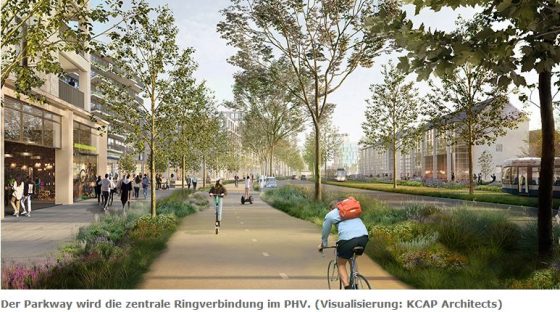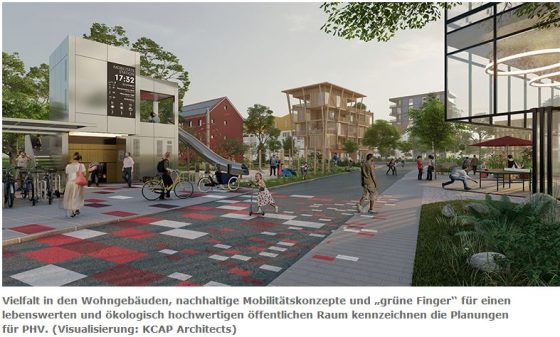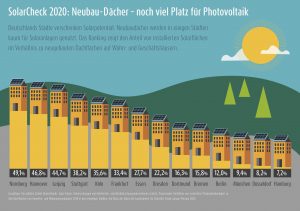 As stated by EU Commission President Ursula von der Leyen in her State of the Union address announced, the European Commission today (Thursday) proposed that EU greenhouse gas emissions should fall by at least 55 percent by 2030 compared to 1990 levels. The previous target was 40 percent. The new target is based on a comprehensive impact assessment of the social, economic and environmental consequences. This shows that 55 percent less emissions is realistic and feasible. The new climate target will help support Europe's economic recovery from the coronavirus pandemic. It also demonstrates the EU's global leadership in the run-up to the next UN climate conference (COP26).
As stated by EU Commission President Ursula von der Leyen in her State of the Union address announced, the European Commission today (Thursday) proposed that EU greenhouse gas emissions should fall by at least 55 percent by 2030 compared to 1990 levels. The previous target was 40 percent. The new target is based on a comprehensive impact assessment of the social, economic and environmental consequences. This shows that 55 percent less emissions is realistic and feasible. The new climate target will help support Europe's economic recovery from the coronavirus pandemic. It also demonstrates the EU's global leadership in the run-up to the next UN climate conference (COP26).
Specifically, the Commission today
- one Amendment of the proposed European Climate Law in order to establish the emissions reduction target of at least 55 per cent by 2030 as an interim target on the way to achieving climate neutrality by 2050;
- Parliament and the Council to adopt this 55 per cent target as a new nationally determined contribution from the EU under the Paris Agreement and report it to the UNFCCC Secretariat by the end of the year;
- the Legislative proposals to be submitted by June 2021 to implement the new target, including: Revising and expanding the EU Emissions Trading Scheme, adapting the Effort Sharing Regulation and the framework for emissions from land use, expanding measures in the areas of energy efficiency and renewable energies and tightening CO2-standards for road vehicles.
Ursula von der Leyen, President of the European Commission, said: "We are doing everything in our power to keep the promise we have made to Europeans: To make Europe the world's first climate-neutral continent by 2050. Today is an important milestone on this path. With the new target of reducing the EU's greenhouse gas emissions by at least 55 per cent by 2030, we will become pioneers on the path to a cleaner planet and a green recovery. Europe will emerge stronger from the coronavirus pandemic by investing in a resource-efficient circular economy, promoting innovative clean technologies and creating green jobs."
Frans Timmermans, Executive Vice-President for the European Green Deal, said: "At this crucial time for our health, our economy and global climate action, it is vital that Europe leads by example on the road to a green recovery. We must act now - we owe it to our children and grandchildren. Today, Europe is demonstrating to the world how we will increase the well-being and prosperity of our citizens over the next decade as we move towards climate neutrality by 2050."
Kadri Simson, Commissioner for Energy, added: "With the current policy measures and Member States' plans, we are on track to exceed our previous reduction target of 40 per cent for 2030. This shows that a more ambitious target is not only necessary but also realistic. The energy system will be at the centre of these efforts. We will build on the European success story in the field of renewable energy, scrutinise all the instruments at our disposal to increase energy efficiency and create a solid foundation for a greener Europe."
In addition to the 2030 climate target plan and the associated impact assessment, the Commission today also published an assessment of the Member States' national energy and climate plans for the period 2021-2030. The Commission's assessment shows that the EU is likely to exceed its current target of reducing emissions by at least 40 per cent by 2030, thanks in particular to continued progress in the use of renewable energy across Europe. In order to achieve the new target of 55 per cent, the EU must further increase energy efficiency and the share of renewable energy. Further consultations and analyses will now be carried out on this before the Commission presents corresponding legislative proposals in June 2021.
The new climate target for 2030 will help to provide targeted support for Europe's economic recovery from the coronavirus pandemic. This will stimulate investment in a resource-efficient economy, promote innovation in clean technologies, improve competitiveness and create green jobs. Member States can draw on the €750 billion NextGenerationEU recovery fund and the next long-term EU budget to make these investments in the green transition.
In order to promote the necessary investments, the Commission today also adopted provisions for a new EU financing mechanism for renewable energies to facilitate cooperation between Member States in the financing and implementation of renewable energy projects. More information here.
Background
An increase in the EU target for the reduction of greenhouse gas emissions by 2030 was first announced in July 2019 in the political guidelines of President von der Leyen announced. This increase is in line with the goal of the Paris Agreement to limit global warming to well below 2 degrees Celsius and to continue efforts to limit it to 1.5 degrees.
Following a broad consultation process last year and as part of the impact assessment published today, the Commission has analysed in detail how a 50-55% reduction in emissions by 2030 compared to 1990 levels would affect our economy, our society and our environment. The impact assessment carefully analysed the policy instruments available and how each sector of the economy can contribute to the targets. The result was that a balanced, realistic and well-considered path to climate neutrality by 2050 requires a target reduction in emissions of at least 55 per cent by 2030.
To reduce greenhouse gas emissions by 55 per cent, action must be taken in all sectors of the economy. A climate-neutral transition is only possible if everyone contributes. The CO2-emissions from the combustion of fossil fuels account for the largest share of greenhouse gas emissions in the EU. Together with diffuse non-CO 2-emissions in the energy system, they are responsible for a good 75 per cent of greenhouse gas emissions in the EU. This clearly shows how important the energy system is for the transition to a climate-neutral economy. Alongside industry, buildings and transport are the most important energy consumers and sources of emissions. The decarbonisation of both energy supply and energy demand is the key to climate neutrality.
As the assessment of the national energy and climate plans has shown, the member states are accelerating their energy and climate transition. Accordingly, the share of renewable energy in the EU could increase to 33.7 per cent by 2030, which exceeds the current target of at least 32 per cent. In terms of energy efficiency, however, the target of at least 32.5 per cent is likely to be missed, namely by 2.8 per cent for primary energy consumption and 3.1 per cent for final energy consumption. The Commission will therefore take action to address this, in particular through the upcoming modernisation wave initiative, the review and possible revision of the Energy Efficiency Directive and guidance on the "energy efficiency first" principle. The assessment of national energy and climate plans at EU level published today will be complemented by assessments for individual Member States in October as part of the State of the Energy Union report.
The regulation proposed by the Commission in March 2020 - the "European Climate Law" - aims to enshrine the 2050 climate neutrality target agreed by EU leaders in December 2019 in EU law and set the direction for EU policy as a whole. The Commission is now proposing to include the revised 2030 target in this Regulation, which is currently being discussed in the European Parliament and the Council. The new 2030 target will also form the basis for discussions on the revision of the EU's nationally determined contribution to reducing emissions under the Paris Agreement.
As set out in the European Green Deal and in today's Communication, the Commission will now start preparing detailed legislative proposals to realise this new target. It will review all climate and energy policy instruments relevant to emission reductions so that it can come forward with appropriate proposals by June 2021.
Further information:
Press release from 17.09.2020
Keywords:
DE-News, Renewable, Climate protection, Mobility, News Blog Europe (without DE), SDG 2030, Environmental policy









